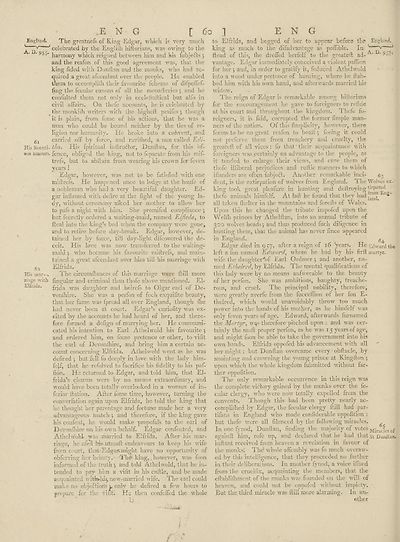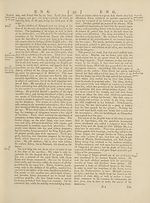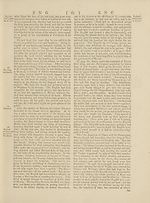Encyclopaedia Britannica, or, a Dictionary of arts, sciences, and miscellaneous literature : enlarged and improved. Illustrated with nearly six hundred engravings > Volume 8, ELE-FOR
(72) Page 60
Download files
Complete book:
Individual page:
Thumbnail gallery: Grid view | List view

6i
His licenti¬
ous amours.
62
His mar* *.
riage with
Eifrida.
ENG [ 60
The greatnefs of King Edgar, which is very much
celebrated by the English hiftorians, was owing to the
harmony which reigned between him and his fubjedts 5
and the reafon of this good agreement was, that the
king tided with Dunftan and the monks, who had ac¬
quired a great afeendant over the people. He enabled
them to accomplish their favourite fcheme of difpoffef-
fing the fecular canons of all the monafteries *, and he
confulted them not only in ecclefiaftical but alio in
civil affairs. On tliefe accounts, he is celebrated by
the monkiih writers with the higheff praifes 5 though
it is plain, from fome of his actions, that he was a
man who could be bound neither by the ties of re¬
ligion nor humanity. He broke into a eohvent, and
carried off by force, and ravilhed, a nun called Ecli-
t/ia. His fpiritual inftruftor, idunitan, for this of¬
fence, obliged the king, not to feparate from his mif-
trefs, but to abftain from wearing his crown for feven
years !
Edgar, however, was not to be fatisned with one
miftrefs. He happened once to lodge at the houfe of
a nobleman who had a very beautiful daughter. Ed¬
gar inflamed with defire at the fight of the young la¬
dy, without ceremony afked her mother to allow her
to pals a night with him. She promifed compliance ;
but fecretly ordered a waiting-maid, named E/Jleda, to
Ideal into the king’s bed when the company were gone,
and to retire before day-break. Edgar, however, de¬
tained her by force, till day-light difeovered the de¬
ceit. His love was now transferred to the waiting-
maid 5 who became his favourite miftrefs, and main¬
tained a great afeendant over him till his marriage with
Eifrida.
The circumftances of this marriage were ftill more
lingular and criminal than thofe above mentioned. Ei¬
frida was daughter and heirefs to Olgar earl of De-
vonlhire. She was a perfon of fuch exquifite beauty,
that her fame was fpread all over England, though flie
had never been at court. Edgar’s euriofity was ex¬
cited by the accounts he had heard of her, and there¬
fore formed a defign of marrying her. He communi¬
cated his intention to Earl Athelwold his favourite 5
and ordered him, on fome pretence or other, to vifit
the carl of Devonlhire, and bring him a certain ac¬
count concerning Eifrida. Athelwold went as he was
defired ; but fell fo deeply in love with the lady bim-
feff, that he refolved to faerifice his fidelity to his paf-
fion. He returned to Edgar, and told him, that El-
frida’s charms were by no means extraordinary, and
Would have been totally overlooked in a woman of in¬
ferior ftation. After fome time, however, turning the
converfation again upon Eifrida, he told the king that
he thought her parentage and fortune made her a very
advantageous match ; and therefore, if the king gave
his co'nfent, he would make propofals to the earl of
Devonihire on his own behalf. Edgar confented, and
Athelwold was. married to Eifrida. After his mar¬
riage, he ufed bris utmoft endeavours to keep his wife
from court, that Edgar, miglit have no opportunity of
obferving her beauty. Thb* king, however, was foon
informed of the truth •, and told Athelwold, that he in¬
tended to pay him a vifit in his caftle, and be made
acquainted wltkjrlu^ new-married wife. The earl could
make no objection's u only he defired a few hours to
for the vint. Kg then confeffed the whole
u
■He Edward the
prepare
] ENG
to Eifrida, and begged of her to appear before the
king as much to the difad vantage as poffible. In
ftead of this, Ihe dreffed herfelf to the greateft ad¬
vantage. Edgar immediately conceived a violent paflion
for her ; and, in order to gratify it, feduced Athelwold
into a wood under pretence of hunting, where he {tab¬
bed him with his own hand, and afterwards married his
widow.
The reiern of Ednar is remarkable among hiftorians
for the encouragement he gave to foreigners to reiide
at his court and throughout the kingdom. Thefe fo¬
reigners, it is faid, corrupted the former fimple man¬
ners of the nation. Of this fimplieity, however, there
feems to be no great reafon to boaft 5 feeing it could
not preferve them from treachery and cruelty, the
greateft of all vices : fo that' their acquaintance with
foreigners was .certainly an advantage to the people, as
it tended to enlarge their views, and cure them of
thofe illiberal prejudices and ruftic manners to w hich
iilandcrs are often fubjeft. Another remarkable inci- 6*
dent, is the extirpation of wolves from England. The Wolves ex-
king took great pleafure in hunting and deftroying tirpated
thefe animals himfelf. At laft he found that they had E|1S~
all taken ftielter in the mountains and forefts of Wales.
Upon this he changed the tribute impofed upon the
Welfh princes by Athelftan, into an annual tribute of
300 wolves heads 5 and thus produced fuch diligence in
hunting them, that the animal has never fmee appeared
in England.
Edgar died in 957, after a reign of 16 yei
left a fon named Edward, whom he had by his fir ft martyr,
wife the daughter'of Earl Ordmer 5 and another, na¬
med Ethelred, by Eifrida. The mental qualifications of
this lady were by no means anfwerable to the beauty
of her perfon. She was ambitious, haughty, treache¬
rous, and cruel. The principal nobility, therefore,
were greatly averfe from the fucceffion of her fon E-
thelred, which would unavoidably throw too much
power into the hands of his mother, as he himfelf was
only feven years of age. Edward, afterwards furnamed
the Martyr, wqs therefore pitched upon : and was cer¬
tainly the moft proper perfon, as he was 15 years of age,
and might foon be able to take the government into his
own hands. Eifrida oppofed his advancement with all
her might : but Dunftan overcame every obftacle, by
anointing and crowning the young prince at Kingfton ;
upon which the whole kingdom fubmitted without far¬
ther oppofition.
The only remarkable occurrence in this reign was
the complete victory gained by the monks over the fe¬
cular clergy, who were now totally expelled from the
convents. Though this had been pretty nearly ac-
complifhed by Edgar, the fecular clergy ftill had par-
tifans in England who made confiderable oppofition :
but thefe were all filenced by the following miracles.
In one fynod, Dunftan, finding the majority of votes Miratfcs 0f
againft him, rofe up, and declared that he had that st Dunftan.
inftant received from heaven a revelation in favour of
the monks; The' whole affembly was fo much overaw¬
ed by this intelligence, that they proceeded no farther
in their deliberations. In another fynod, a voice iffued
from the crucifix, acquainting the members, that the
eftablifiiment of the monks was founded on the will of
heaven, and could not be oppofed without impiety.
But the third miracle was ftill more alarming. In an¬
other
His licenti¬
ous amours.
62
His mar* *.
riage with
Eifrida.
ENG [ 60
The greatnefs of King Edgar, which is very much
celebrated by the English hiftorians, was owing to the
harmony which reigned between him and his fubjedts 5
and the reafon of this good agreement was, that the
king tided with Dunftan and the monks, who had ac¬
quired a great afeendant over the people. He enabled
them to accomplish their favourite fcheme of difpoffef-
fing the fecular canons of all the monafteries *, and he
confulted them not only in ecclefiaftical but alio in
civil affairs. On tliefe accounts, he is celebrated by
the monkiih writers with the higheff praifes 5 though
it is plain, from fome of his actions, that he was a
man who could be bound neither by the ties of re¬
ligion nor humanity. He broke into a eohvent, and
carried off by force, and ravilhed, a nun called Ecli-
t/ia. His fpiritual inftruftor, idunitan, for this of¬
fence, obliged the king, not to feparate from his mif-
trefs, but to abftain from wearing his crown for feven
years !
Edgar, however, was not to be fatisned with one
miftrefs. He happened once to lodge at the houfe of
a nobleman who had a very beautiful daughter. Ed¬
gar inflamed with defire at the fight of the young la¬
dy, without ceremony afked her mother to allow her
to pals a night with him. She promifed compliance ;
but fecretly ordered a waiting-maid, named E/Jleda, to
Ideal into the king’s bed when the company were gone,
and to retire before day-break. Edgar, however, de¬
tained her by force, till day-light difeovered the de¬
ceit. His love was now transferred to the waiting-
maid 5 who became his favourite miftrefs, and main¬
tained a great afeendant over him till his marriage with
Eifrida.
The circumftances of this marriage were ftill more
lingular and criminal than thofe above mentioned. Ei¬
frida was daughter and heirefs to Olgar earl of De-
vonlhire. She was a perfon of fuch exquifite beauty,
that her fame was fpread all over England, though flie
had never been at court. Edgar’s euriofity was ex¬
cited by the accounts he had heard of her, and there¬
fore formed a defign of marrying her. He communi¬
cated his intention to Earl Athelwold his favourite 5
and ordered him, on fome pretence or other, to vifit
the carl of Devonlhire, and bring him a certain ac¬
count concerning Eifrida. Athelwold went as he was
defired ; but fell fo deeply in love with the lady bim-
feff, that he refolved to faerifice his fidelity to his paf-
fion. He returned to Edgar, and told him, that El-
frida’s charms were by no means extraordinary, and
Would have been totally overlooked in a woman of in¬
ferior ftation. After fome time, however, turning the
converfation again upon Eifrida, he told the king that
he thought her parentage and fortune made her a very
advantageous match ; and therefore, if the king gave
his co'nfent, he would make propofals to the earl of
Devonihire on his own behalf. Edgar confented, and
Athelwold was. married to Eifrida. After his mar¬
riage, he ufed bris utmoft endeavours to keep his wife
from court, that Edgar, miglit have no opportunity of
obferving her beauty. Thb* king, however, was foon
informed of the truth •, and told Athelwold, that he in¬
tended to pay him a vifit in his caftle, and be made
acquainted wltkjrlu^ new-married wife. The earl could
make no objection's u only he defired a few hours to
for the vint. Kg then confeffed the whole
u
■He Edward the
prepare
] ENG
to Eifrida, and begged of her to appear before the
king as much to the difad vantage as poffible. In
ftead of this, Ihe dreffed herfelf to the greateft ad¬
vantage. Edgar immediately conceived a violent paflion
for her ; and, in order to gratify it, feduced Athelwold
into a wood under pretence of hunting, where he {tab¬
bed him with his own hand, and afterwards married his
widow.
The reiern of Ednar is remarkable among hiftorians
for the encouragement he gave to foreigners to reiide
at his court and throughout the kingdom. Thefe fo¬
reigners, it is faid, corrupted the former fimple man¬
ners of the nation. Of this fimplieity, however, there
feems to be no great reafon to boaft 5 feeing it could
not preferve them from treachery and cruelty, the
greateft of all vices : fo that' their acquaintance with
foreigners was .certainly an advantage to the people, as
it tended to enlarge their views, and cure them of
thofe illiberal prejudices and ruftic manners to w hich
iilandcrs are often fubjeft. Another remarkable inci- 6*
dent, is the extirpation of wolves from England. The Wolves ex-
king took great pleafure in hunting and deftroying tirpated
thefe animals himfelf. At laft he found that they had E|1S~
all taken ftielter in the mountains and forefts of Wales.
Upon this he changed the tribute impofed upon the
Welfh princes by Athelftan, into an annual tribute of
300 wolves heads 5 and thus produced fuch diligence in
hunting them, that the animal has never fmee appeared
in England.
Edgar died in 957, after a reign of 16 yei
left a fon named Edward, whom he had by his fir ft martyr,
wife the daughter'of Earl Ordmer 5 and another, na¬
med Ethelred, by Eifrida. The mental qualifications of
this lady were by no means anfwerable to the beauty
of her perfon. She was ambitious, haughty, treache¬
rous, and cruel. The principal nobility, therefore,
were greatly averfe from the fucceffion of her fon E-
thelred, which would unavoidably throw too much
power into the hands of his mother, as he himfelf was
only feven years of age. Edward, afterwards furnamed
the Martyr, wqs therefore pitched upon : and was cer¬
tainly the moft proper perfon, as he was 15 years of age,
and might foon be able to take the government into his
own hands. Eifrida oppofed his advancement with all
her might : but Dunftan overcame every obftacle, by
anointing and crowning the young prince at Kingfton ;
upon which the whole kingdom fubmitted without far¬
ther oppofition.
The only remarkable occurrence in this reign was
the complete victory gained by the monks over the fe¬
cular clergy, who were now totally expelled from the
convents. Though this had been pretty nearly ac-
complifhed by Edgar, the fecular clergy ftill had par-
tifans in England who made confiderable oppofition :
but thefe were all filenced by the following miracles.
In one fynod, Dunftan, finding the majority of votes Miratfcs 0f
againft him, rofe up, and declared that he had that st Dunftan.
inftant received from heaven a revelation in favour of
the monks; The' whole affembly was fo much overaw¬
ed by this intelligence, that they proceeded no farther
in their deliberations. In another fynod, a voice iffued
from the crucifix, acquainting the members, that the
eftablifiiment of the monks was founded on the will of
heaven, and could not be oppofed without impiety.
But the third miracle was ftill more alarming. In an¬
other
Set display mode to:
![]() Universal Viewer |
Universal Viewer | ![]() Mirador |
Large image | Transcription
Mirador |
Large image | Transcription
Images and transcriptions on this page, including medium image downloads, may be used under the Creative Commons Attribution 4.0 International Licence unless otherwise stated. ![]()
| Permanent URL | https://digital.nls.uk/192264355 |
|---|
| Attribution and copyright: |
|
|---|
| Description | Ten editions of 'Encyclopaedia Britannica', issued from 1768-1903, in 231 volumes. Originally issued in 100 weekly parts (3 volumes) between 1768 and 1771 by publishers: Colin Macfarquhar and Andrew Bell (Edinburgh); editor: William Smellie: engraver: Andrew Bell. Expanded editions in the 19th century featured more volumes and contributions from leading experts in their fields. Managed and published in Edinburgh up to the 9th edition (25 volumes, from 1875-1889); the 10th edition (1902-1903) re-issued the 9th edition, with 11 supplementary volumes. |
|---|---|
| Additional NLS resources: |
|

